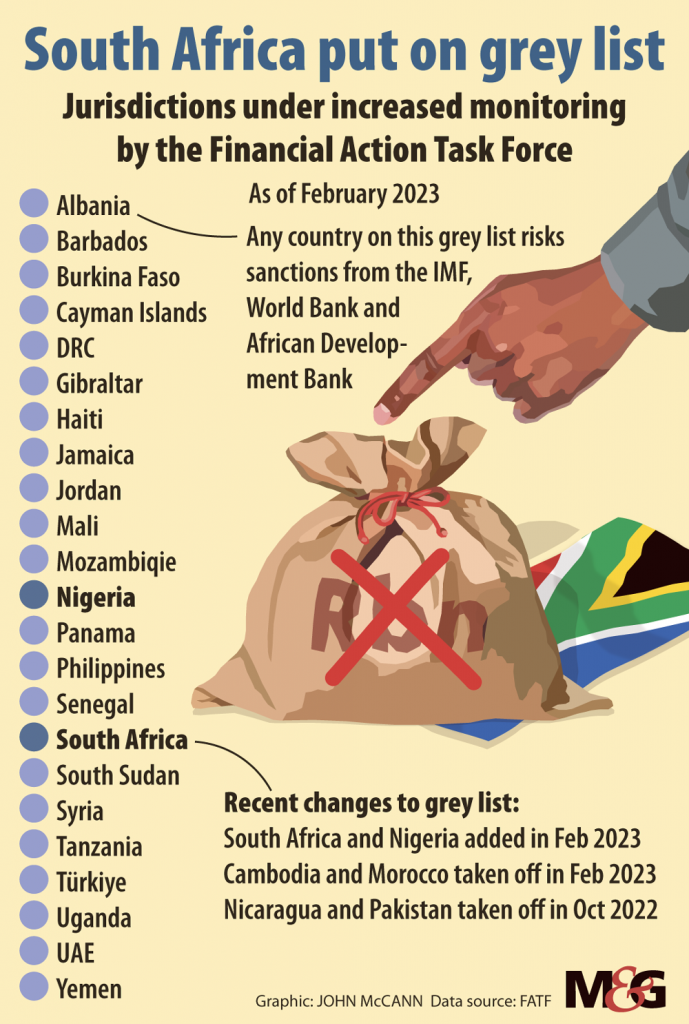The longer that South Africa is under increased monitoring, the worse it will be for the country’s economy
Despite the government’s efforts to bring South Africa’s anti-money laundering framework up to scratch, the country has been greylisted by the Financial Action Task Force (FATF).
South Africa will now be under increased monitoring, the Paris-based international financial crimes watchdog confirmed on Friday — days after Finance Minister Enoch Godongwana said the country should brace for this eventuality.
Analysts have warned that landing on the grey list could cost the country’s already fragile economy.
In its announcement, FATF noted that South Africa has made a high-level political commitment to work with the watchdog as well as the Eastern and Southern Africa Anti-Money Laundering Group to strengthen its regime to tackle money laundering and terrorist financing.
In response to the greylisting, the national treasury noted in a statement that Godongwana has informed FATF president Raja Kumar that cabinet has considered the watchdog’s action plan and is committed to actively working alongside the two bodies.
“The government recognises that addressing the action items will be in the interest of South Africa, and that doing so is consistent with our existing commitment to rebuild the institutions that were weakened during the period of state capture, the effectiveness of which is essential to addressing crime and corruption,” the statement said.
In late 2021, FATF found that South Africa failed in 20 of 40 standards and in all 11 of the measures to combat money laundering.
Since then, South Africa has made significant progress on many of the recommended actions to improve its system, FATF said. These interventions include developing anti-money laundering and counter terrorist financing policies to address higher risks and newly amending the related legal framework.
Godongwana’s budget review noted the enactment of two laws in 2022 — the General Laws (Anti-Money Laundering and Combating Terrorism Financing) Amendment Act and the Protection of Constitutional Democracy Against Terrorist and Related Activities Amendment Act — which address 15 of the 20 shortcomings flagged by the task force.
 (John McCann/M&G)
(John McCann/M&G)Speaking at a media briefing shortly before the minister tabled the budget, acting treasury director general Ismail Momoniat said he believed that an adverse finding by FATF would be mitigated by the fact that South Africa has made a sincere effort to meet standards.
“It does look to me like there has been real progress,” Momoniat said.
The government has held discussions with FATF on three perceived remaining areas of weakness, among them poor anti-money-laundering controls in non-financial sectors, including the legal profession, real estate and trust service providers.
The country’s response to the state capture scandal and its ability to prosecute the culprits is under scrutiny. The watchdog has pointed to a need to increase criminal investigations, prosecutions and asset recovery in money-laundering and terror-financing cases.
The budget allocates R1.3 billion for the National Prosecuting Authority over two years, with the funding intended to allow it to hire 120 employees with a focus on solving complex financial crime cases.
Godongwana has allocated an additional R265.3 million to the Financial Intelligence Centre over the medium term to implement the recommendations of the FATF and the Zondo commission.
In its Friday statement, the treasury said it expects that the increased monitoring will have limited impact on financial stability and costs of doing business with South Africa.
“This will, however, be monitored closely. Importantly, the costs of increased monitoring will be substantially lower than the long-term costs of allowing South Africa’s economy to be contaminated by the flows of proceeds of crime and corruption.”
The longer that South Africa is under increased monitoring, the worse it will be for the country’s economy, Intellidex warned in a report released in October.
In the event that greylisting is sustained, the report noted, and global confidence in South African efforts to address FATF recommendations is low, the reputational impact will have a material effect on investment flows and financing costs. International banks will also be more likely to reject South African clients on compliance cost and risks.